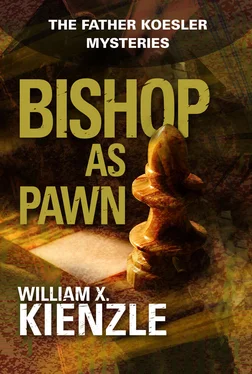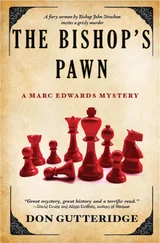William Kienzle - Bishop as Pawn
Здесь есть возможность читать онлайн «William Kienzle - Bishop as Pawn» весь текст электронной книги совершенно бесплатно (целиком полную версию без сокращений). В некоторых случаях можно слушать аудио, скачать через торрент в формате fb2 и присутствует краткое содержание. Жанр: Криминальный детектив, на английском языке. Описание произведения, (предисловие) а так же отзывы посетителей доступны на портале библиотеки ЛибКат.
- Название:Bishop as Pawn
- Автор:
- Жанр:
- Год:неизвестен
- ISBN:нет данных
- Рейтинг книги:3 / 5. Голосов: 1
-
Избранное:Добавить в избранное
- Отзывы:
-
Ваша оценка:
- 60
- 1
- 2
- 3
- 4
- 5
Bishop as Pawn: краткое содержание, описание и аннотация
Предлагаем к чтению аннотацию, описание, краткое содержание или предисловие (зависит от того, что написал сам автор книги «Bishop as Pawn»). Если вы не нашли необходимую информацию о книге — напишите в комментариях, мы постараемся отыскать её.
Bishop as Pawn — читать онлайн бесплатно полную книгу (весь текст) целиком
Ниже представлен текст книги, разбитый по страницам. Система сохранения места последней прочитанной страницы, позволяет с удобством читать онлайн бесплатно книгу «Bishop as Pawn», без необходимости каждый раз заново искать на чём Вы остановились. Поставьте закладку, и сможете в любой момент перейти на страницу, на которой закончили чтение.
Интервал:
Закладка:
They both laughed.
“By the way,” Mark said, “who’s the new guy?”
“What new guy?”
“The one who came in with the Ste. Anne’s crew?”
“Oh … okay … I can’t think of his name right now, but he’s about to become a Detroit priest. Didn’t you see the announcement in the Detroit Catholic?”
“I must’ve missed it.”
“He’s a Maryknoller … an older guy.”
Actually, the priest in question was a Maryknoll missionary, or, more technically, a member of the Catholic Foreign Mission Society of America.
“I always thought that a missionary vocation would be sort of thrilling,” Mark mused. “You know: China, Africa, Japan, South America-exotic places. Why would he want to work in Detroit?”
“I don’t know.” Charlie shrugged. “But it’s gonna take him a while.”
“Why?”
“’Cause the Maryknoll order has to let him go before our archdiocese can ‘adopt’ him. It’s a regular process … something about ‘incardination’ and ‘excardination.’ I asked Father Kerin, but he said we’d study it later in Canon Law.”
“Yeah, yeah. Just like all the questions about sex and marriage …”
“‘We’ll study it later,’” they said in unison.
CHAPTER ONE
“I’m being sued,” Father Bert Echlin stated.
Father Ernie Bell snorted. “If you lose, you’ll have to borrow money to pay off.”
“They always think we’ve got an infinite pile of money back of us,” Father Henry Dorr said.
“Well, we have, in a way.” Father Frank Dempsey chuckled. “If any one of us gets into enough trouble, they can always sell the Sistine Chapel.”
“Who’d want it?” Echlin wondered.
“Why? What are you getting sued for?” Dorr asked,
“My sidewalk.”
“You got a sidewalk?” Dempsey joked.
“I got a sidewalk, okay,” Echlin said. “It looks like it got bombed. I mean, I’m used to potholes in the streets. But in the sidewalks?”
“So it’s an eyesore. What’s so different about that?” Dempsey shook his head. “If people in this city sued over eyesores …”
“A woman fell on my sidewalk,” Echlin said.
“Fell?” Dorr said.
“Fell, or took a dive. Anyway, she’s suing. After I got a call from her lawyer, I walked around the parish. I’ve got the best sidewalk in the neighborhood.” Echlin half grimaced. “I think I got spoiled by my previous parish. In Monroe, if you got problems you get a notice from the city: Either you fix it or the city fixes it and sends you the bill.”
“Welcome to Detroit,” said Dorr.
It was nearing 10:30. The quarterly meeting of the city priests was winding down. The catering crew, having cleared away the food, had departed. The liquor supply and a few priests remained.
Much of the evening’s conversation had centered on the city in which these priests lived and ministered. They griped about the mayor, one Maynard Cobb; about the Common Council; about city services, or more realistically the lack thereof; about the provision for snow removal, which was the periodic but fairly dependable forty-plus degrees of temperature; about street lighting, which was spotty at best; about city pockets where police protection was intense in contrast to the larger stretches of the city pretty much left to shift for themselves; about the erratic mass transit boondoggle; about the pervasive presence of drugs with their concomitant violence, which was all too frequently fatal, and at the very least overwhelmingly vitiating.
These were all “safe” topics. Practically every gathering of two or more citizens in metropolitan Detroit, whether in the suburbs or the city, griped about the selfsame things.
Members of the select group of priests who called themselves the “hard core” of the core city were easily as concerned about Big Brother as they were about their wounded and limping city.
Big Brother was embodied by the various layers of Church bureaucracy, which seemed to these priests to be obsessed with how they were functioning liturgically, canonically, and socially.
Some few of their colleagues were aligned quite frankly with Big Brother. Thus, in these meetings, conversation was steered along “safe” paths. That way there would be nothing to report; even bureaucrats complained about the city and its many failings.
However, once those who felt some allegiance to the power structure were not present, the “hard core” group felt more free to talk about what interested them: their Church and their ministry.
But tonight, their aim was to discover just where this Don Carleson fit into the scheme of things. Their technique, traditionally, was not a frontal assault; rather, they would sound out the newcomer on his opinion of and approach to some of the points of common interest to them all.
Two more priests checked their watches, shrugged, and headed for home. This left the four who had been assessing the sad state of city maintenance, Father Carleson, and Father Koesler.
Ernie Bell had arrived about forty-five minutes late for the meeting. It was evident that he’d been drinking, and while the meal had sobered him somewhat, he still had not completely recovered.
“So, Don,” Dorr began, “you’re a Maryknoller. Where were you working before you came here?”
“Oh, just an insignificant diocese in Central America. Nobody’s ever heard of it.”
“What brings you to Detroit?” Echlin asked.
“I’m tempted to say Northwest Airlines. But I know you’re serious. So, I didn’t come here blindly. I checked out the major dioceses in the States and this one seemed most promising.”
“This one?” Dempsey’s tone suggested skepticism. “Pound for pound, we’ve got more problems than any other metropolitan diocese I can think of.”
Carleson shook his head. “You’ve gone through the Council right from its beginning in the early sixties. Most of the other dioceses ducked Vatican II. They’re still fighting their way through it. This thing adapting to the Council and its spirit-like most other things depended on who the bishop happened to be. Your guy-Boyle-has fought his way through it. Still fighting.”
“Yeah, but they put you in Ste. Anne’s,” Dorr said. “Things are just as poor there as you could have had in the missions.”
“No.” Carleson smiled. “These people here aren’t really poor. Why, most of them have TV sets. In the Third World, there are just two societies: the extremely wealthy and the dirt poor. And when I say dirt poor, I mean it literally.”
“So, then,” Dorr said, “that’s why you came back: The missions were more miserable than you counted on?”
“No, not really. It was the bishops.”
“Bishops!” Dorr snorted. “You really lucked into it, didn’t you? Getting assigned to Diego!”
Through clenched teeth Carleson replied, “That’s only temporary.”
“Temporary?” Echlin chuckled mirthlessly. “Not if he thinks he can make your life truly miserable.”
Carleson didn’t respond.
But Ernie Bell did. He almost exploded. Seemingly, the mention of the bishop’s name had roused him. “Diego! That bastard! Diego, that goddam bastard!”
“What’s the matter with Diego?” Dempsey wondered.
“You don’t know?” Koesler said. “I thought everyone knew.”.
“Diego discovered that he could make Ernie’s life miserable,” Echlin said. “And he’s been doing pretty well at it ever since.”
“How come I didn’t know that?” Dempsey asked.
“I don’t know.” Echlin shrugged. “It’s pretty common knowledge, at least among the guys.”
“But Ernie, you speak Spanish. You’re good at it,” Dempsey protested. He looked at the others. “My God, he’s at St. Gabriel’s … right in the heart of the Latino community. Why would Diego give him a hard time?”
Читать дальшеИнтервал:
Закладка:
Похожие книги на «Bishop as Pawn»
Представляем Вашему вниманию похожие книги на «Bishop as Pawn» списком для выбора. Мы отобрали схожую по названию и смыслу литературу в надежде предоставить читателям больше вариантов отыскать новые, интересные, ещё непрочитанные произведения.
Обсуждение, отзывы о книге «Bishop as Pawn» и просто собственные мнения читателей. Оставьте ваши комментарии, напишите, что Вы думаете о произведении, его смысле или главных героях. Укажите что конкретно понравилось, а что нет, и почему Вы так считаете.












